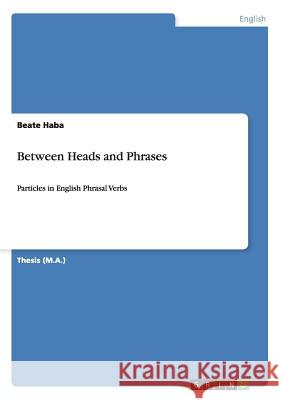Between Heads and Phrases: Particles in English Phrasal Verbs » książka
Between Heads and Phrases: Particles in English Phrasal Verbs
ISBN-13: 9783640832750 / Angielski / Miękka / 2011 / 76 str.
Between Heads and Phrases: Particles in English Phrasal Verbs
ISBN-13: 9783640832750 / Angielski / Miękka / 2011 / 76 str.
(netto: 230,82 VAT: 5%)
Najniższa cena z 30 dni: 228,34
ok. 16-18 dni roboczych.
Darmowa dostawa!
Thesis (M.A.) from the year 2009 in the subject English Language and Literature Studies - Linguistics, grade: 2,0, University of Wuppertal (Anglistik/Amerikanistik), language: English, abstract: This master's thesis deals with the question how to deal with particles in phrasal verbs which are dealt with in different way. In the course of this work, it becomes obvious that particles are hybrids between prepositions and spatio-locative adverbs. But a clear assignment to one of the two categories is almost impossible as these elements provide a historically based interdependency between syntax and semantics. Starting from this perspective, the major claim is that the particles, leaving their literal domain, lose their lexical autonomy as they attach to the verbal head. Literal particles, like prepositions, are syntactically and semantically autonomous. Therefore, they may be treated as a subclass of the category preposition. This is not possible with particles in phrasal verbs which in facts are grammaticalized. This aspect seems to be neglected by the generative grammarians who concentrate on the explanation of particle movement. The questions which are dealt with are, above all, how to account for the particle movement and if the particle moves away from the verbal basis, which constituent then does assign the Case to the object noun phrase. Second aim of this paper is to risk attempt to provide some reason for the syntax-semantic interface within directional particles. It will be observed that today's directional prepositions and adverbial particles are related in so far as they originate in phrasal adverbs, formerly separable prefixes (Hiltunen 1983) which, owing to their concrete meaning and strong stress, have survived the changes. Thus, due to their favourable inherent semantics, adverbial particles in phrasal verbs have assumed three different forms and functions driven by the principle of split or divergence as proposed by Hopper (1991). Thereof, the various











